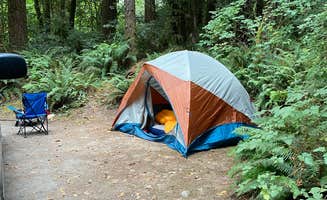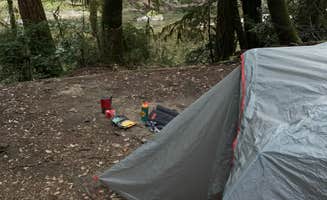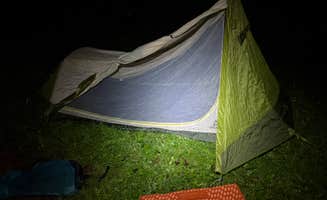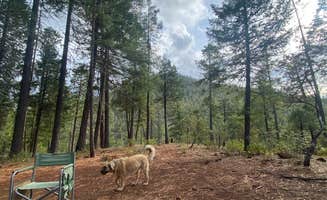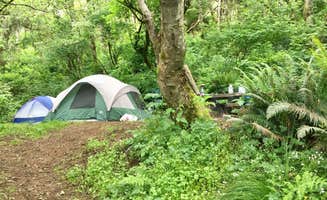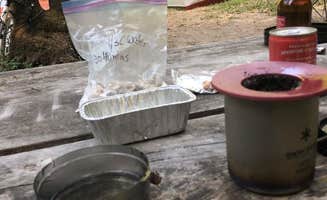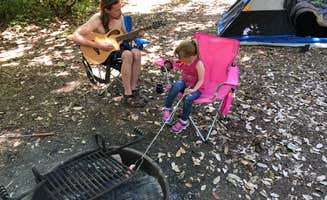Dispersed camping near Brookings, Oregon provides access to the southern Oregon coast and adjacent forest land. The Rogue River-Siskiyou National Forest contains numerous primitive camping options situated along forest roads and river access points. Winter camping requires preparation for potential storms and heavy rainfall, while summer months offer more reliable weather conditions but can bring increased competition for the most desirable sites.
What to do
Swimming at North Fork Campground: Located on a pristine swimming hole with deeper water sections for full immersion. "Right on a beautiful swimming hole. Has pit toilets. Even if you find other campers there (rare) you cant hear anything due to the river," notes camper P R. The water remains cold even during summer months, providing refreshing relief on hot days.
Fish for trout: Local rivers contain productive fishing opportunities during proper seasons. According to one camper staying at Ludlum Campground, "We met a kid that was fishing the river and claimed to have caught some nice trout." Fishing licenses required from Oregon Department of Fish and Wildlife.
Hiking nearby trails: Forest trails connect to several campgrounds, offering day hiking opportunities. The Chimney Camp trail system passes near camping areas but can sometimes face closures. Nathan at Ludlum notes, "The nearby trail, Chimney Camp, was blocked and it seems like this is a common occurrence."
What campers like
Privacy between sites: Several forest campgrounds offer spacing that provides solitude. "The campsites were fairly far apart so there wasn't much interaction (which is what we were going for)," reports a camper at Ludlum Campground. This separation allows for quieter camping experiences away from neighboring groups.
Direct river access: Camping directly on riverbanks ranks as a top feature. Dennis R. describes Miller Bar Camping and Day Use Area: "Drive down the windy steep road to the riverbank and set up camp wherever you'd like." This proximity allows for convenient water activities without needing to transport gear.
Less crowding at smaller campgrounds: Lesser-known sites typically have fewer visitors. Jennifer W. reports about Ludlum: "We were so lucky to find this campground. All the other campgrounds were full up at the time. It's very remote, about 3 miles from 101 and on to a gravel road."
What you should know
Seasonal insect concerns: Summer brings increased mosquito activity at certain sites. "The biggest downside was the mosquitos. Tons..... of mosquitos," cautions a June visitor to Ludlum Campground. Bring appropriate repellent during warmer months.
Security considerations: Some locations have experienced theft issues. A ranger warning mentioned at Ludlum Campground: "Beware of thieves. The last day as we were leaving the Ranger came up and asked about a white, windowless van and told us that they had been stealing gear for the past year or so."
Water availability varies: Not all campgrounds provide drinking water. Some locations like Quail Prairie Lookout require bringing all water supplies: "As pointed out you must pack up your gear, food and water." Others offer hand pumps or require filtering from nearby streams.
Tips for camping with families
Choose sites with toilet facilities: When camping with children, basic restroom access becomes important. Miller Bar offers "pit toilets and garbage pickup. No hookups or water," according to Ariel & John W. This provides minimal but functional facilities for families.
Riverside locations for entertainment: Water access provides natural recreation for children. Miller Bar allows camping "just feet from the river. Kayak & swim everyday," providing built-in activities without additional equipment.
Consider smaller campgrounds: Less crowded options work well for families. Jennifer W. describes Elko Camp Recreation Site as "Camping at its best. Wound ourselves all around and came upon this spot. Oh yeah." The additional space allows children more freedom to explore safely.
Tips from RVers
Access challenges for larger vehicles: Many forest roads present difficulties for RVs. Jennifer W. notes about Ludlum: "The spaces were rather small and I think an RV would have a hard time fitting into the spaces." Most dispersed camping areas require careful navigation on narrow, winding roads.
4x4 recommended for river camping: Reaching prime riverside spots often requires capable vehicles. Miller Bar campers advise: "4x4 is probably a must have as the river bank is just rocks." Standard passenger vehicles may struggle to reach the most desirable camping locations along riverbanks.
Avoid misleading RV parks: Some commercial facilities may not match their advertising. Daric G. warns about Whaleshead Beach Resort RV Park: "Not at all what is advertised. 90% of the spots are being used for primary residences. By the looks of them (tarps and all) they have been there for a very long time. It's very steep down to the rv sites and very treed."


